|
|
|
Sort Order |
|
|
|
Items / Page
|
|
|
|
|
|
|
| Srl | Item |
| 1 |
ID:
146768
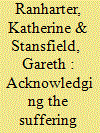

|
|
|
|
|
| Summary/Abstract |
The Iraqi High Tribunal (IHT), as a mechanism of transitional justice, took upon it a pioneering role within the Middle Eastern Region by prosecuting and convicting several high-ranking members of the former suppressive regime in Iraq. As part of this work, the IHT confronted the widespread impunity for and disregard of gender-based crimes, such as rape and other sexual violence, and took steps towards reforming the sector through its progressive statute and the specific acknowledgment of gender crimes within its judgments. It will be the aim of the following article to extend academic writings on Iraq, the IHT and gender, by providing insights into how the tribunal dealt with the issues of rape and sexual violence, the surrounding circumstances and how successful the IHT's recognition of these crimes proved for transitional justice in Iraq.
|
|
|
|
|
|
|
|
|
|
|
|
|
|
|
|
| 2 |
ID:
146769


|
|
|
|
|
| Summary/Abstract |
This article scrutinizes a highly gendered nationalist discourse shaped by a group of Kurdish nationalist men who sought to break with their Ottoman past while exiled in Syria and Lebanon in the 1930s and 1940s. Based on a critical reading of publications edited by Jaladet and Kamuran Bedirkhan, this study elaborates how the vision of Kurdish nationalism put forward by the Bedirkhan brothers, despite its emphasis on the emancipation of women, held the same patriarchal aspects of their rival Kemalist Turkish counterparts. A gendered approach is clearly discernible in Kurdish nationalists' views regarding major issues such as the failure of recent Kurdish nationalist rebellions and the prescribed national duties of women and men. Their reflections on the Second World War during the war years reveal another aspect of the Kurdish nationalist discourse. Kurdish nationalists, admirably watching the Allied European soldiers' sacrifices and victories, unwittingly expressed a crisis of masculinity emanating from their perceived inability to do anything for their own country.
|
|
|
|
|
|
|
|
|
|
|
|
|
|
|
|
| 3 |
ID:
146767
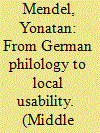

|
|
|
|
|
| Summary/Abstract |
This article examines the pedagogical shifts in the study of Arabic at the Hebrew Reali School in Haifa, the leading school for Arabic studies in the Jewish education system. Analyzing the moulding of Arabic studies in the crucial years of educational institutionalization (1913–48), it demonstrates an inevitable tension with regard to Arabic studies: between the German philological approach and the ‘practical’ approach. In light of this tension, it shows the gradual emergence of a new ‘practical’ approach in the Jewish education system in Palestine, which was not only the result of a clash between different pedagogical methods, but was propelled by another, powerful, clash: that of the heated political conflict in Palestine. Using primary sources from seven different archives, in Israel, Britain and Germany, this article reveals that the shift towards practicality was motivated by political developments and ideological shifts as much as by pedagogical considerations, and therefore has had significant ramifications for the emerging field of Arabic studies in Jewish schools in Palestine/Israel.
|
|
|
|
|
|
|
|
|
|
|
|
|
|
|
|
| 4 |
ID:
146773
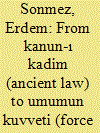

|
|
|
|
|
| Summary/Abstract |
This paper attempts to examine the prevailing scholarly view on the Young Ottoman and the Young Turk movements, which postulates that the concept of constitutionalism was solely and directly based on the western model, imported by the constitutionalist movements to the Ottoman Empire. As a child of the ‘modernization theory’, this approach mostly concentrates on European impact in an isolated manner, thus overlooking not only the manifold sources of the Ottoman constitutionalism, but also the means of legitimation that the Young Ottomans and the Young Turks cultivated. In view of this, I seek to shed light on the historical context of the Ottoman constitutionalism, by pointing out how the Young Ottomans and the Young Turks perceived the power struggles in the course of the seventeenth and eighteenth centuries, and built continuity between themselves and the political position that aimed to restrict the royal prerogative before the nineteenth century.
|
|
|
|
|
|
|
|
|
|
|
|
|
|
|
|
| 5 |
ID:
146772
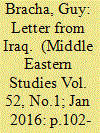

|
|
|
|
|
| Summary/Abstract |
The most extensive participation of Jews in the literary Arabic revival (The Nahda) was in monarchial Iraq. Jewish Intellectuals had contributed to the development of national Iraqi culture. These intellectuals have been studied in the context of the non-Jewish Iraqi intellectuals, focusing on their national and cultural integration in the new Iraqi state. This article observes the participation of those intellectuals in two non-Iraqi Jewish journals which were published in literary Arabic, Israʾil, published in Cairo, and al-ʿAlam al-Israʾili, published in Beirut. By changing the point of view from Iraqi Jews in the non-Jewish Iraqi cultural sphere to Iraqi Jews in a non-Iraqi Jewish cultural sphere, the article examines their relation between Iraqi identity and the national Jewish identity.
|
|
|
|
|
|
|
|
|
|
|
|
|
|
|
|
| 6 |
ID:
146770
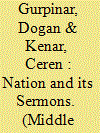

|
|
|
|
|
| Summary/Abstract |
This article will attempt to develop an in-depth examination of the pivotal role of Islam in the articulation of Turkish nationalism and Turkish official identity by examining the sermons authorized and imposed by the Presidency of Religious Affairs (PRA), the state agency regulating religion, and how the their cosmologies of social, moral and political order are entwined. We will further argue that this role involves a twofold process; firstly, the Muslim identity was imagined as a prerequisite for being considered as a Turk and a Turkish citizen and, secondly, the ‘cultural intimacy’ of Turkish nationalism is grounded on the ‘root paradigms’ inherited and attained from the Islamic tradition and theology. These arguments are particularly pertinent at a time when Islamist JDP (Justice and Development Party) consolidated its power and began to instrumentalize PRA for its priorities and visions of Islam. This, however, does not bring a radical reshuffling of PRA. On the contrary, the continuity from the Kemalist-monitored PRA to the JDP-monitored PRA can be attested not only in its organizational features but also in its ideological make up; especially in terms of its perceptions of society, state and social order.
|
|
|
|
|
|
|
|
|
|
|
|
|
|
|
|
| 7 |
ID:
146771
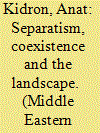

|
|
|
|
|
| Summary/Abstract |
Haifa was named a ‘mixed city’ by the British, who ruled Palestine from 1917 to 1948, in reference to the two national communities that inhabited the town. This definition was not neutral, and reflected the Brits aspirations to create national coexistence in Palestine among the diverse urban societies.
|
|
|
|
|
|
|
|
|
|
|
|
|
|
|
|
| 8 |
ID:
146774
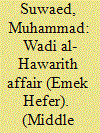

|
|
|
|
|
| Summary/Abstract |
The Wadi al-Hawarith (Emek Hefer) affair was considered to be one of the prominent land disputes between Jews and Arabs in Palestine during the British mandate period. The region in which the dispute broke out was found south of Hadera in Emek Hefer.
|
|
|
|
|
|
|
|
|
|
|
|
|
|
|
|
|
|
|
|
|